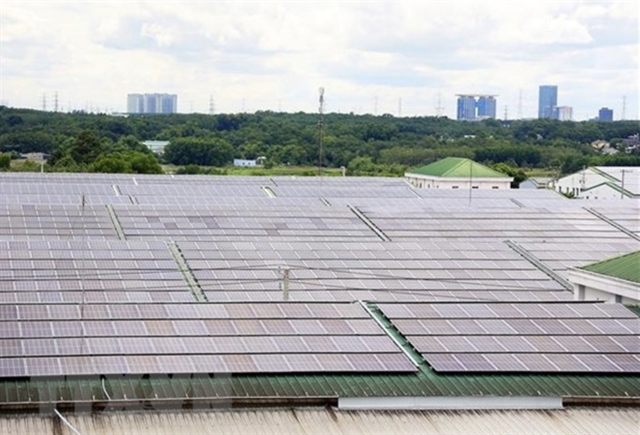 Society
Society


|
| Solar power is used in many industrial parks, creating renewable and environmentally friendly energy sources. VNA/VNS Photo Hồng Đạt |
HÀ NỘI – The development of the circular economy aims to create impetus for innovation and improve labour productivity, contributing to achieving economic development, environmental sustainability and social equality, according to economic experts.
This was one of the many messages raised at the forum of Regulatory Sandbox for Circular Economy Development.
Dr. Trần Thị Hồng Minh, director of the Central Institute of Economic Management (CIEM), said: “In order to soon realise benefits from the circular economy, generating a driving force for businesses and investors to transform and create a circular economy model is particularly important, especially for a number of potential industries and fields such as agriculture, industry, energy, and building materials.”
Decision No. 687/QD-TTg in 2022 approving the project of circular economy development in Việt Nam is one of the first and important efforts to determine the roadmap, requirements and orientation need for economic growth in Việt Nam, the director told the forum.
Co-hosted by the CIEM and the German International Co-operation Agency (GIZ) in Việt Nam yesterday in Hà Nội, the aim of the forum was to assess the challenges and obstacles as well as propose policies for the circular economy in Việt Nam in the future.
According to Nguyễn Anh Dương, head of CIEM's Research Department, the circular economy is toward a green, carbon-neutral economy and contributes to the goal of limiting global temperature rise.
However, Việt Nam is also facing big challenges in terms of resource depletion, environmental pollution and climate change, Dương said.
“These challenges become complicated in the context that the country is also continuing the process of population growth, urbanisation and industrialisation but it is still slow to transition from the traditional linear economic approach that results in more and more serious consequences for resource supply, large amount of waste, environmental security and water source security,” Dương said.
These challenges also require Việt Nam to take a more serious look at the requirements of sustainable development, increase the level of independence and autonomy of the economy and the resilience of the supply chain, which, promotes the development of a circular economy model is one of the important solutions and directions in line with the orientation that many countries around the world are approaching and transforming, he said.
Meanwhile, Dr. Minh said that due to the circular economy associated with new design thinking, innovative applications and related to many different policy areas, the traditional, sequential approach to completing relevant policies is necessary but not enough.
It is necessary to quickly create new impetus for businesses, investors and employees through policies to promote "green recovery" in the context of economic recovery and serious difficulties for economic sectors of agriculture, industry, energy, and construction materials in the first months of this year, Minh said.
Accordingly, an important task to soon concretise these orientations is to issue a decree on a pilot mechanism for circular economy development.
The formation of a solid legal basis for circular economy development will also help concretise contents of international cooperation related to the circular economy including green energy transformation and agriculture.
Speaking in the forum, Dương affirmed that in economies that use many natural resources, a transition towards a circular economy can offer many opportunities to pursue economic diversification and access higher-value markets.
Along with that, international cooperation plays a very important role in accessing, applying and mastering science-technology and innovation in circular economy development, Dương said.
And the policies to support enterprises participating in the implementation of circular economy projects are essential, he said.
The goal of policy formulation is to encourage investors and businesses to early testing ideas and initiatives of the circular economy contributing to the “green transition and recovery” in Việt Nam.
Through sharing perspectives on the current situation, barriers and recommendations for appropriate policies for the development of the circular economy in Việt Nam, CIEM hopes to soon propose an effective testing mechanism to develop a circular economy in the coming period, Minh said. VNS




